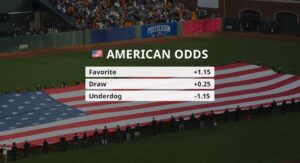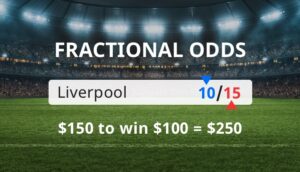Bankroll Management
It is hard enough to beat the sportsbooks with their 10% vig or more on some wagers, but bettors make it even tougher on themselves when they don’t manage their bankroll correctly.
Bankroll management is right up there with getting the best line or price on a game and can make or break a handicapper’s profitability not only for one season, but for their entire sports betting career.
Managing your bankroll is a crucial part to your success as a sports bettor, so keep reading to learn how to reduce your risk of ruin.
Bookie of the Month
The Importance of Bankroll Management
We’ve met a lot of talented NFL handicappers over the years, many of them who were among the best at finding the most profitable markets on the board and predicting the outcome of games at a surprisingly high rate. Shockingly, many of these NFL bettors weren’t profitable at handicapping the NFL. In fact, some weren’t even close to making money.
The reason boils down to bankroll management, one area in which many bettors are downright ignorant. One of our experts played in a local poker game alongside someone who always seemed to have spot-on opinions on the week’s games. Week after week, he’d talk NFL lines with him and ended up having a highly profitable first half to the season, partly due to his advice. He assumed he had done the same.
Our expert nonchalantly asked him how he was doing on the year one evening, and he responded that he was “getting killed.” He was shocked. Our expert explained to him that he had been right on nearly every game they talked about.

“Yeah, I know”, he said. He proceeded to tell our expert how he would always lose his final bet of the week. He then laid out his strategy of betting the amount he won over the weekend all on the Monday Night Game. Our expert sighed and explained to him that was not a smart way to manage his bankroll, and it was a recipe for disaster.
Shockingly, he was not convinced and felt his strategy was fine and that he was just having a miserable run of luck. Of course, that could not be further from the truth. He didn’t understand bankroll management, and it was costing him immensely.
Although he was a talented NFL handicapper, he would never become profitable simply because he did not have a bankroll management plan.
Bankroll Management Reduces Your Risk of Ruin
There are several schools of thought when it comes to bankroll management for sports betting.
The general consensus among handicappers is to generally bet 1-2% of your bankroll per event to reduce your risk of ruin. The absolute worst thing to happen as a sports bettor is to spread yourself too thin and end up being out of action because you didn’t manage your bet size correctly.
For this reason, it is essential to adopt some form of bankroll strategy and stick to it. Overextending yourself can cause you to go broke or reduce your bet size, which can knock you out of action for the rest of the season (or for good!) or drastically hurt your profitability.
What Does Your Bankroll Mean to You?
Before we go into more specific methods to manage your bankroll and bet size, it’s crucial to ask the question what your bankroll mean to you? Are you a serious bettor who doesn’t want to risk losing his roll? Or are you a more recreational bettor who doesn’t mind winning or losing? Would you be willing to add more money to your bankroll if you went on an extended losing streak?
If you don’t mind reloading funds into your sportsbook account and have some reserve funds available to bet, then it would make more sense that you could be more aggressive with your wagers. Those that have a set amount side aside for their bankroll and cannot add to it would be wise to be less aggressive.

Betting Units
You should establish a betting unit based on your bankroll and bet size. This betting unit won’t change and will give you a good idea of roughly how many bets you have at your disposal and make it easier to manage your betting funds.
If we have an influx of cash added to our roll or a large run of profits, we can then begin to think about changing our unit size. It is up to you if you want to count your profits as part of your bankroll and keep expanding your unit size. However, we would not recommend this, at least not early on.
Also, remember to account for bonuses and promotions. These add extra money to your bankroll and even though they require a rollover to withdraw, they are just more extra money to bet with and should be accounted as such.
How Much Should I Bet Per Wager?
That is a tough one, and there are many differing options on the subject. Many advocate flat betting each wager, and that may be the best idea for novice bettors who have a harder time quantifying their edge against the sportsbooks.
Optimally, it is probably best to bet on semi-Kelly criterion based system, which has shown to be excellent in many gambling games and sports betting.
Kelly betting allows you to adjust your bet size based on how strongly you feel your bet is against the oddsmakers’ line.
Overall, this strategy has been proven to be optimal, provided that you can accurately judge the strength of each bet.
When we first began betting the NFL, we would strictly bet the same amount per wager. We had no reason to change anything. We were profitable bettors for a number of years, and we believed we were doing things the right way. We weren’t wrong in our approach but after a while, we started varying our bets based on how strong we felt about each one.
We ended up becoming more profitable because our instincts were fined tuned after many years of betting to spot value and bet accordingly. It really depends on how you feel about your NFL handicapping skill, but just be fair warned that some of your “strongest” plays may end up being losers.
We’d never advocate wagering more than 5% of your total bankroll on a single day and to not differentiate your bet sizes too rapidly.
For instance, a 1-unit play might be your ‘standard’ bet while a 3-unit play would be a bet that you absolutely love.
Most bets should be on the low edge of your betting range. If you think oddsmakers are making lots of mistakes each week, we’ve got news for you – you’re not smarter than them.
Keeping Accurate Records
Keeping accurate records of your bet sizes and wagers will help you not only keep track of your profits, losses and overall win/loss record, but help you analyze your betting action and allow for some introspection.
Record keeping is a must in sports betting and when it comes down it; your overall win/loss is truly what it is all about. Don’t give yourself a chance to delude yourself by not keep accurate records.

Betting Opportunities
The fact that the NFL is the most wagered US sport by a large margin is a massive testament to the sport’s popularity among sports bettors. Why do we say this? Compared to the other three major professional sports leagues (NBA, MLB, and NHL), the NFL has by far the least number of wagering opportunities.
Yes, there is 20+ weeks of action, and over a dozen games per week in an NFL season and playoffs, but that pales in comparison to the schedules of other leagues.
Each NFL team plays 16 regular season games, and if they are lucky make the playoffs. The NHL and NBA have 82-game regular seasons, along with best-of-seven matchups throughout the playoffs and into the NBA finals.
Finally, Major League Baseball has a whopping 162-game regular season and best-of-seven series format for much of their postseason, as well.
As crazy as it may sound, many professional sports bettors don’t even bother to learn NFL handicapping because of the limited number of betting opportunities compared to other sports. We love betting on the NFL, and we are excellent at it, but we’d be kidding ourselves if we didn’t realize how bettors have a much smaller number of chances to beat the sportsbooks compared to other sports.
This is one of the reasons a profitable NFL bettor may have a losing season here and there, while it is less likely for a multi-sport handicapper to have a losing year due to the sheer number of bets they place, which in turn reduces variance.
We’re certainly not advocating betting more than you can afford, but it is vital to strike while the iron is hot, as they say. Since your betting opportunities are limited, you will need to make them count. We don’t advocate betting more than a half-dozen wagers per week, but if you are a proven profitable handicapper in regards the NFL, it might be worth considering increasing your bet size compared to other sports.
less likely for a multi-sport handicapper to have a losing year due to the sheer number of bets they place
Another important aspect to note is that higher odds bets such as parlays, teasers and underdog moneylines will have a higher degree of variance compared to straight wagers. In the right spots, these can be quite profitable, but it is necessary to remember the larger the payoff of the bet, the more likely you are to lose the wager and the more bankroll fluctuations you will experience.
Keep Your Emotions in Check
If you have been betting for a while, you know that you will face losing streaks. If you’re new to betting you will soon find this out. This happens to the best handicappers in the world, and it is no reason to panic and start questioning your abilities.
In regards to bankroll management, the best advice we can give is to stay the course. Don’t do something crazy and start betting bigger to chasing your losses – that is a recipe for disaster.
Stick with your bankroll requirements and plan that you started at the beginning of the season. It’s easy to manage your bankroll during your hot streaks but doing it during rough losing streaks takes a lot more self-control.
It’s a Marathon, Not a Sprint!
Betting is a long-term investment for us, and we must believe that solid handicapping and line shopping over a long period of time will yield consistent profits. It’s hard to not get caught up in your week-to-weeks results, but remember that you’re focused on long term profitability. Stay the course, do your research and you should be fine.






